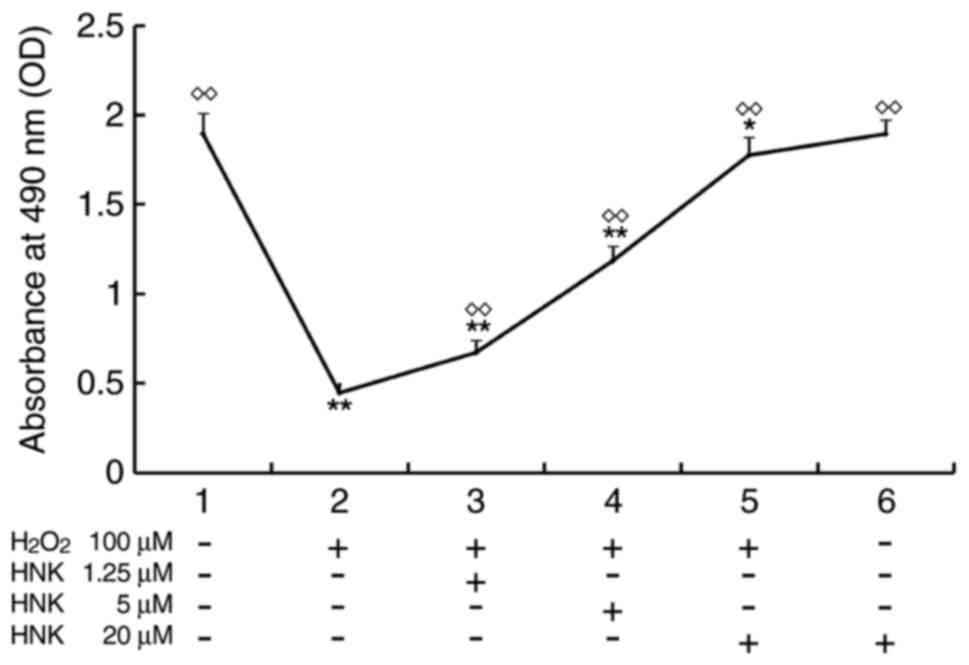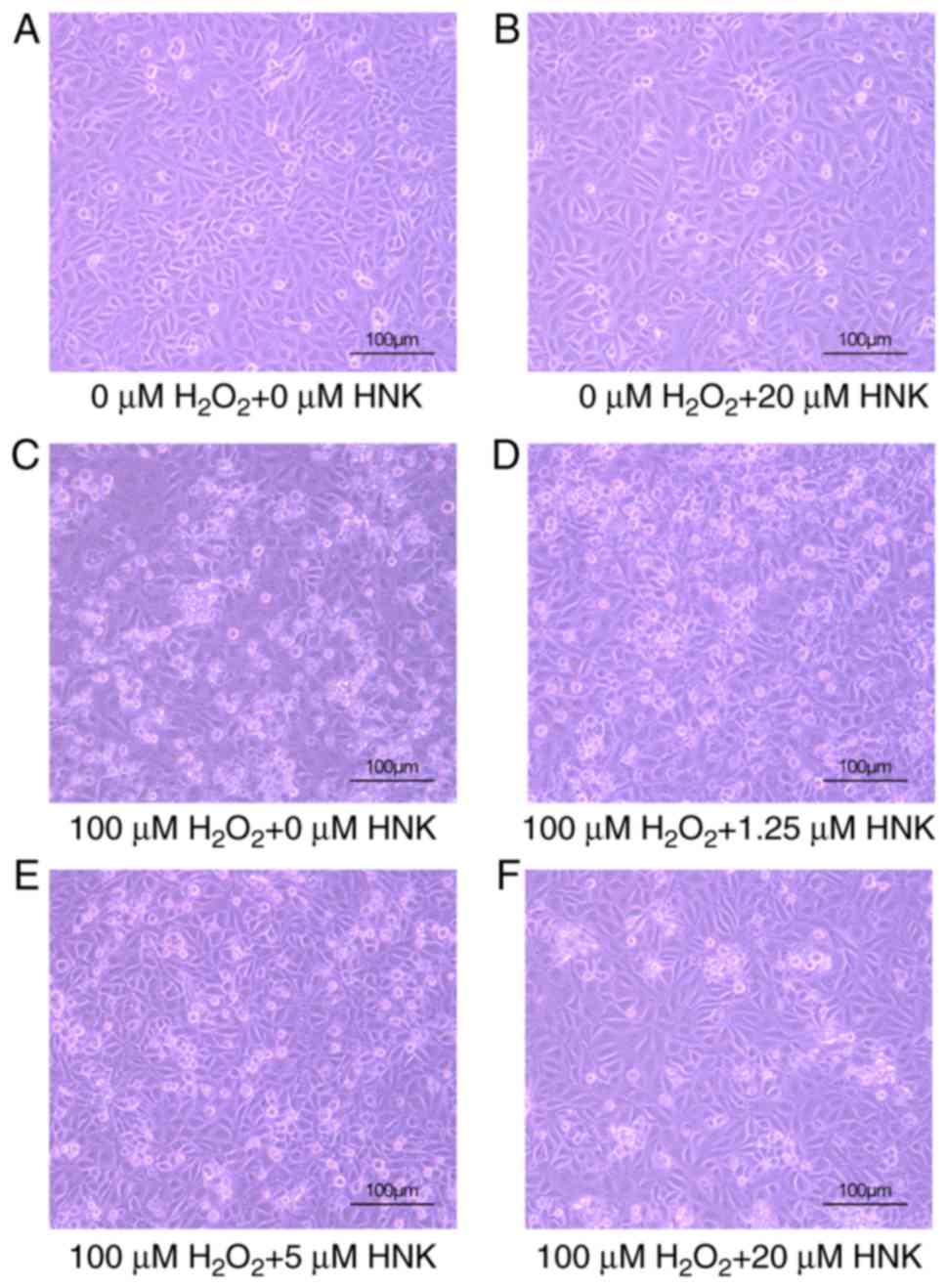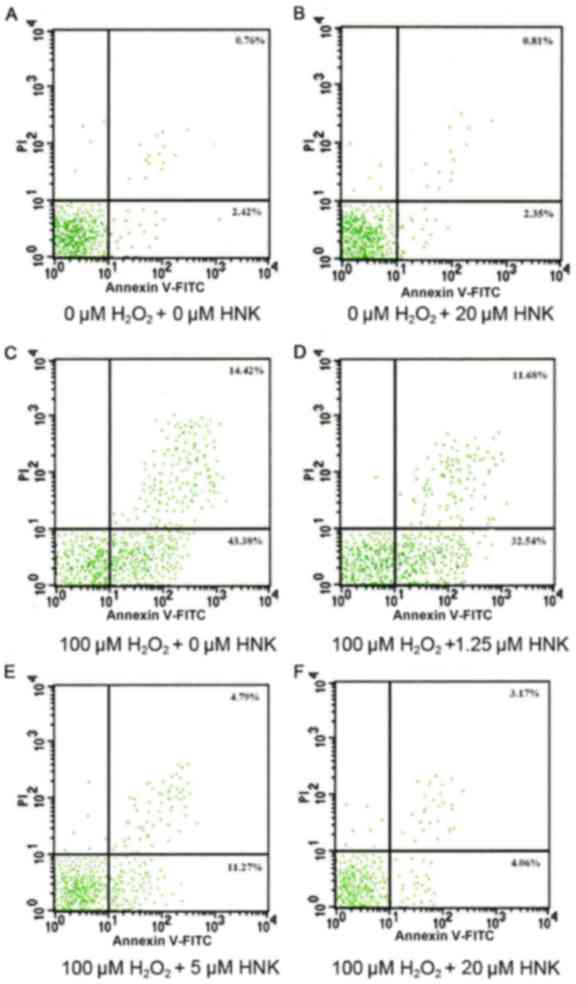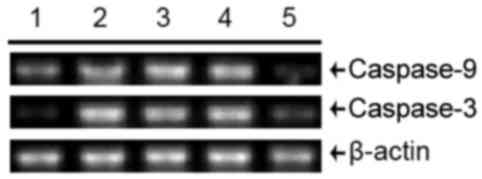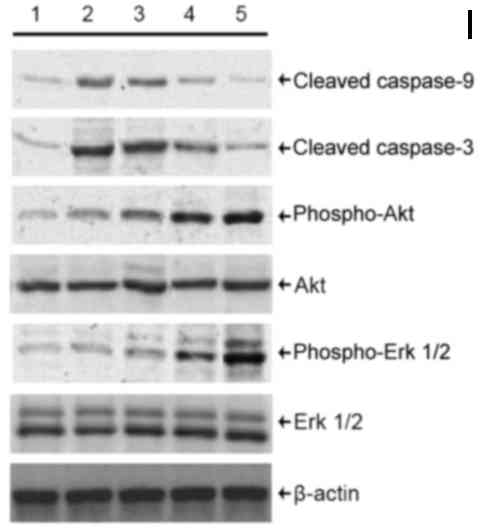|
1
|
Thorner PS, Ho M, Eremina V, Sado Y and
Quaggin S: Podocytes contribute to the formation of glomerular
crescents. J Am Soc Nephrol. 19:495–502. 2008. View Article : Google Scholar : PubMed/NCBI
|
|
2
|
Gnudi L, Coward RJM and Long DA: Diabetic
nephropathy: Perspective on novel molecular mechanisms. Trends
Endocrinol Metab. 27:820–830. 2016. View Article : Google Scholar : PubMed/NCBI
|
|
3
|
Marshall CB and Shankland SJ: Cell cycle
and glomerular disease: A minireview. Nephron Exp Nephrol.
102:e39–e48. 2006. View Article : Google Scholar : PubMed/NCBI
|
|
4
|
Xia H, Bao W and Shi S: Innate immune
activity in glomerular podocytes. Front Immunol. 8:1222017.
View Article : Google Scholar : PubMed/NCBI
|
|
5
|
Shibata S, Nagase M, Yoshida S, Kawachi H
and Fujita T: Podocyte as the target for aldosterone: Roles of
oxidative stress and Sgk1. Hypertension. 49:355–364. 2007.
View Article : Google Scholar : PubMed/NCBI
|
|
6
|
Johansen JS, Harris AK, Rychly DJ and
Ergul A: Oxidative stress and the use of antioxidants in diabetes:
Linking basic science to clinical practice. Cardiovasc Diabetol.
4:52005. View Article : Google Scholar : PubMed/NCBI
|
|
7
|
Zou H, Yang R, Hao J, Wang J, Sun C, Fesik
SW, Wu JC, Tomaselli KJ and Armstrong RC: Regulation of the
Apaf-1/caspase-9 apoptosome by caspase-3 and XIAP. J Biol Chem.
278:8091–8098. 2003. View Article : Google Scholar : PubMed/NCBI
|
|
8
|
Fried LE and Arbiser JL: Honokiol, a
multifunctional antiangiogenic and antitumor agent. Antioxid Redox
Signal. 11:1139–1148. 2009. View Article : Google Scholar : PubMed/NCBI
|
|
9
|
Wang F, Zhang G, Zhou Y, Gui D, Li J, Xing
T and Wang N: Magnolin protects against contrast-induced
nephropathy in rats via antioxidation and antiapoptosis. Oxid Med
Cell Longev. 2014:2034582014. View Article : Google Scholar : PubMed/NCBI
|
|
10
|
Wang Y, Zhang ZZ, Wu Y, Zhan J, He XH and
Wang YL: Honokiol protects rat hearts against myocardial ischemia
reperfusion injury by reducing oxidative stress and inflammation.
Exp Ther Med. 5:315–319. 2013. View Article : Google Scholar : PubMed/NCBI
|
|
11
|
Wu F, Zhang W, Li L, Zheng F, Shao X, Zhou
J and Li H: Inhibitory effects of honokiol on
lipopolysaccharide-induced cellular responses and signaling events
in human renal mesangial cells. Eur J Pharmacol. 654:117–121. 2011.
View Article : Google Scholar : PubMed/NCBI
|
|
12
|
Yu Y, Li M, Su N, Zhang Z, Zhao H, Yu H
and Xu Y: Honokiol protects against renal ischemia/reperfusion
injury via the suppression of oxidative stress, iNOS, inflammation
and STAT3 in rats. Mol Med Rep. 13:1353–1360. 2016. View Article : Google Scholar : PubMed/NCBI
|
|
13
|
Zeng W, Tang J, Li H, Xu H, Lu H, Peng H,
Lin C, Gao R, Lin S, Lin K, et al: Caveolin-1 deficiency protects
pancreatic β cells against palmitate-induced dysfunction and
apoptosis. Cell Signal. 47:65–78. 2018. View Article : Google Scholar : PubMed/NCBI
|
|
14
|
Li L, Wang X, Sharvan R, Gao J and Qu S:
Berberine could inhibit thyroid carcinoma cells by inducing
mitochondrial apoptosis, G0/G1 cell cycle arrest and suppressing
migration via PI3K-AKT and MAPK signaling pathways. Biomed
Pharmacother. 95:1225–1231. 2017. View Article : Google Scholar : PubMed/NCBI
|
|
15
|
Zhang B, Shen Q, Chen Y, Pan R, Kuang S,
Liu G, Sun G and Sun X: myricitrin alleviates oxidative
stress-induced inflammation and apoptosis and protects mice against
diabetic cardiomyopathy. Sci Rep. 7:442392017. View Article : Google Scholar : PubMed/NCBI
|
|
16
|
Sargin AK, Can B and Turan B: Comparative
investigation of kidney mesangial cells from increased oxidative
stress induced diabetic rats by using different microscopy
techniques. Mol Cell Biochem. 390:41–49. 2014. View Article : Google Scholar : PubMed/NCBI
|
|
17
|
Thomson SE, McLennan SV, Kirwan PD,
Heffernan SJ, Hennessy A, Yue DK and Twigg SM: Renal connective
tissue growth factor correlates with glomerular basement membrane
thickness and prospective albuminuria in a non-human primate model
of diabetes: Possible predictive marker for incipient diabetic
nephropathy. J Diabetes Complications. 22:284–294. 2008. View Article : Google Scholar : PubMed/NCBI
|
|
18
|
Wang A, Ziyadeh FN, Lee EY, Pyagay PE,
Sung SH, Sheardown SA, Laping NJ and Chen S: Interference with
TGF-beta signaling by Smad3-knockout in mice limits diabetic
glomerulosclerosis without affecting albuminuria. Am J Physiol
Renal Physiol. 293:F1657–F1665. 2007. View Article : Google Scholar : PubMed/NCBI
|
|
19
|
Osterbt R and Gundersen HJ: Glomerular
size and structure in diabetes mellitus. I. Early abnormalities.
Diabetologia. 11:225–229. 1975.
|
|
20
|
Jefferson JA, Shankland SJ and Pichler RH:
Proteinuria in diabetic kidney disease: A mechanistic viewpoint.
Kidney Int. 74:22–36. 2008. View Article : Google Scholar : PubMed/NCBI
|
|
21
|
White KE, Bilous RW, Marshall SM, El Nahas
M, Remuzzi G, Piras G, De Cosmo S and Viberti G: Podocyte number in
normotensive type 1 diabetic patients with albuminuria. Diabetes.
51:3083–3089. 2002. View Article : Google Scholar : PubMed/NCBI
|
|
22
|
DallaVestra M, Masiero A, Roiter AM,
Saller A, Crepaldi G and Fioretto P: Is podocyte injury relevant in
diabetic nephropathy? Studies in patients with type 2 diabetes.
Diabetes. 52:1031–1035. 2003. View Article : Google Scholar : PubMed/NCBI
|
|
23
|
Mekinová D, Chorváthová V, Volkovová K,
Staruchová M, Grancicová E, Klvanová J and Ondreicka R: Effect of
intake of exogenous vitamins C, E and beta-carotene on the
antioxidative status in kidneys of rats with streptozotocin-induced
diabetes. Nahrung. 39:257–261. 1995. View Article : Google Scholar : PubMed/NCBI
|
|
24
|
Obrosova I, Fathallah L and Greene D:
Early changes in lipid peroxidation and antioxidative defense in
rat retina: Effect of DL-alpha-lipoic acid. Eur J Pharm.
398:139–146. 2000. View Article : Google Scholar
|
|
25
|
Skyrme-Jones RA, O'Brien RC, Berry KL and
Meredith IT: Vitamin E supplementation improves endothelial
function in type I diabetes mellitus: A randomized,
placebo-controlled study. J Am Coll Cardiol. 36:94–102. 2000.
View Article : Google Scholar : PubMed/NCBI
|
|
26
|
Gaede P, Poulsen HE, Parving HH and
Pedersen O: Double-blind, randomised study of the effect of
combined treatment with vitamin C and E on albuminuria in Type 2
diabetic patients. Diabet Med. 18:756–760. 2001. View Article : Google Scholar : PubMed/NCBI
|
|
27
|
Liou KT, Shen YC, Chen CF, Tsao CM and
Tsai SK: The anti-inflammatory effect of honokiol on neutrophils:
Mechanisms in the inhibition of reactive oxygen species production.
Eur J Pharmacol. 475:19–27. 2003. View Article : Google Scholar : PubMed/NCBI
|
|
28
|
Tuo QH, Wang C, Yan FX and Liao DF: MAPK
pathway mediates the protective effects of onychin on oxidative
stress-induced apoptosis in ECV304 endothelial cells. Life Sci.
76:487–497. 2004. View Article : Google Scholar : PubMed/NCBI
|
|
29
|
Agustian PA, Schiffer M, Gwinner W,
Schäfer I, Theophile K, Modde F, Bockmeyer CL, Traeder J, Lehmann
U, Grosshennig A, et al: Diminished met signaling in podocytes
contributes to the development of podocytopenia in transplant
glomerulopathy. Am J Pathol. 178:2007–2019. 2011. View Article : Google Scholar : PubMed/NCBI
|
|
30
|
Yang B, Oo TN and Rizzo V: Lipid rafts
mediate H2O2 prosurvival effects in cultured endothelial cells.
FASEB J. 20:1501–1503. 2006. View Article : Google Scholar : PubMed/NCBI
|
|
31
|
Kim JH, Choi W, Lee JH, Jeon SJ, Choi YH,
Kim BW, Chang HI and Nam SW: Astaxanthin inhibits H2O2-mediated
apoptotic cell death in mouse neural progenitor cells via
modulation of P38 and MEK signaling pathways. J Microbiol
Biotechnol. 19:1355–1363. 2009. View Article : Google Scholar : PubMed/NCBI
|
|
32
|
Kim JW, Lee JE, Kim MJ, Cho EG, Cho SG and
Choi EJ: Glycogen synthase kinase 3 beta is a natural activator of
mitogen-activated protein kinase/extracellular signal-regulated
kinase kinase kinase 1 (MEKK1). J Biol Chem. 278:13995–14001. 2003.
View Article : Google Scholar : PubMed/NCBI
|
|
33
|
Pap M and Cooper GM: Role of glycogen
synthase kinase-3 in the phosphatidylinositol 3-Kinase/Akt cell
survival pathway. J Biol Chem. 273:19929–19932. 1998. View Article : Google Scholar : PubMed/NCBI
|















